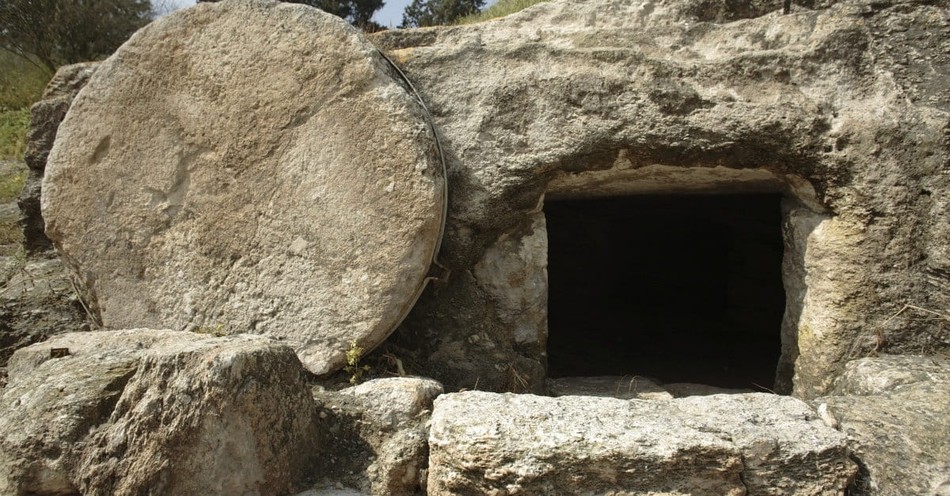In traditional Christian theology, the Harrowing of Hell, or "the descent of Christ into Hell" or Hades, is the saving act of Christ to the souls in Hades between His Crucifixion and Resurrection. In triumphant descent, Christ preached and bestowed salvation to the souls held captive there since the beginning of the world.
Christ's descent to the underworld is indicated in 1 Peter 4:6, which notes that the "good tidings were proclaimed to the dead". Ephesians 4:9 states that "[Christ] descended into the lower parts of the earth", also supporting this interpretation. However, these passages in the Bible have given rise to differing understandings. The Harrowing of Hell is observed in the liturgical calendar on Holy Saturday.
"For this reason the gospel was preached also to those who are dead, that they might be judged according to men in the flesh, but live according to God in the spirit." (1 Peter 4:6 NKJV)
"Now this, "He ascended"--what does it mean but that He also first descended into the lower parts of the earth? He who descended is also the One who ascended far above all the heavens, that He might fill all things." (Ephesians 4:9-10 NKJV)
Apostle Paul's way of intertwining the Ascension of Christ ("He ascended") with the descent of the Spirit ("gave gifts") reveals the relationship between the body of Christ and the gifts of the Spirit. "The lower parts of the earth" is either the earth itself, referring to the Incarnation; or the burial or Hades, the place of the dead, referring to Christ's death and descent into hell (1 Peter 3:19). Only Christ, as God and Man, can fill all things, that is, reign over the unification and fulfillment of creation.
Jesus' Descent to Hell in the Bible
The most cited Bible passage for the account of Jesus descending to hell before His resurrection is 1 Peter 3:18-20.
“For Christ also died for sins once for all, the just for the unjust, in order that He might bring us to God, having been put to death in the flesh, but made alive in the spirit; in which also He went and made proclamation to the spirits now in prison, who once were disobedient, when the patience of God kept waiting in the days of Noah, during the construction of the ark, in which a few, that is, eight persons, were brought safely through the water.”
As Noah preached righteousness, suffered unjustly, and rescued those who were with him, so also does Christ. Christ descended to those in darkness and death that light might shine on them and He might deliver them from death. As Christ fearlessly faced His tormenters, death, and Hell, so we through Him can confidently face mockers and tormentors, and bring His light to them by faith.
Christ’s descent into Hell, or Hades, can actually be found in both the Old and New Testaments. It constitutes a portion of the biblical narrative of how God saves us through Jesus Christ. Hell can be seen as the holding place where the souls of the good and the bad went after death (Luke 16:19-31). It is to be differentiated from Gehenna, the place of eternal torment (Mark 9:42-48; Revelation 20:14).
Christ’s descent into Hades was anticipated by Jesus himself in Matthew’s Gospel.
"For as Jonah was three days and three nights in the belly of the great fish, so will the Son of Man be three days and three nights in the heart of the earth.” (Matthew 12:40)
Here Jesus foreknew in the Prophet Jonah’s three nights in the whale a foreshadowing of what would happen to Him in His approaching crucifixion.
The Apostle Peter spoke of Jesus’ descent into Hell in his Pentecost sermon:
"He [David], foreseeing this, spoke concerning the resurrection of the Christ, that His soul was not left in Hades, nor did His flesh see corruption." (Acts 2:31)
Get your FREE Holy Week Guide here. Have encouragement delivered straight to your inbox!
Jesus' Descent to Hell in the Apostle's Creed
I believe in God, the Father Almighty, Creator of Heaven and earth; and in Jesus Christ, His only Son Our Lord, Who was conceived by the Holy Spirit, born of the Virgin Mary, suffered under Pontius Pilate, was crucified, died, and was buried.
He descended into Hell; on the third day He rose again from the dead; He ascended into Heaven, and sitteth at the right hand of God, the Father almighty; from thence He shall come to judge the living and the dead.
I believe in the Holy Spirit, the holy Catholic Church, the communion of saints, the forgiveness of sins, the resurrection of the body, and life everlasting.
What Might It Mean that Jesus Descended into Hell Before He Was Resurrected?
Theologians differ on what the passage means. Garrett Kell provides one perspective on this issue in his video, "Did Jesus Descend into Hell Before He Was Resurrected?"
(transcript of the video above, edited for readability)
I remember growing up—even though I was a non-Christian, I grew up in a church—and sometimes I would read the Apostle's Creed, and there's a later addition to the Apostles Creed that says, "and he descended into hell." I always wondered about that. And then after I became a Christian, that was one of my first questions and I began reading through the scriptures. You've got this place in 1 Peter 3. It speaks about Christ that after his death, that "he was made alive in the spirit," verse 18, then in verse 19, in which "he went and proclaimed to the spirits in prison." And then he goes on to talk about these spirits who are in prison, that they "disobeyed in the days of Noah."
I was like, "What in the world does that mean?" And what appears to happen is that when Christ died on the cross, we always wonder, well, what happened in those three days where he was? Well, his body, it says, was in the tomb, and his spirit evidently descended to Hades or the place of the dead. I don't think it's right to call it Hell. Hell appears to be something that's coming later. Hell isn't something that's now. Hell is the lake of fire that will one day come. So Hades is the place of the dead. Apparently, according to 1 Peter (and you also see it in Jude and 2 Peter as well), there were some angels who did something bad in the days of Noah and they got resigned to a place. If you remember, during Jesus's ministry, he's casting out some demons and they say, "Don't send us to that place. Put us in the pigs." Instead, there's a place that the demons knew about that they didn't want to go to. Well, it appears that that's where Jesus went during that time, and he proclaimed victory that he had through his death and the resurrection that was about to happen, that he had defeated sin, Satan, and death, and that their condemnation was going to be certain. And then on the third day after his crucifixion, he rose from the dead.
Now, there are some preachers today who will say that he descended into hell and there he received all this different stuff and I just, that's just not in the Bible at all. It appears that what happened was he went into that place and he proclaimed the gospel in the sense that, "this is what has happened. Judgment is now certain."
Further Reading:
Did Jesus Descend into Hell After He Died?
What Is the Harrowing of Hell? The Descent of Christ into Hades
Photo Credit: Thinkstock/Motimeiri
Learn more about the meaning and significance behind the Easter holiday and Holy Week celebrations:
What is Lent? and When Does Lent Start?
What is Ash Wednesday? and When is Ash Wednesday?
What is Palm Sunday?
What is Maundy Thursday?
What is Good Friday? and When is Good Friday?
What is Holy Saturday?
What is Easter? and When is Easter Sunday?
Easter Bible Verses
The Resurrection of Jesus
Easter Prayers



